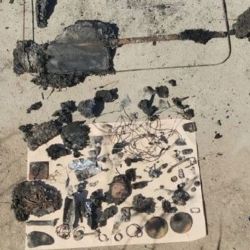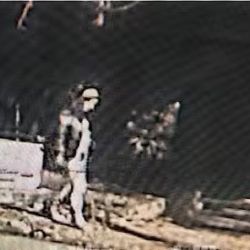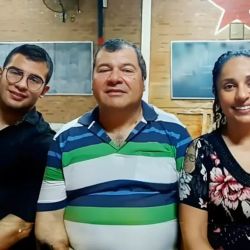More than two years after the disappearance and presumed femicide of 28-year-old Cecilia Strzyzowski, judges in Chaco are to begin hearing one of the most significant and high-profile trials in the northern province’s history.
Proceedings begin Tuesday, October 28, in the provincial capital of Resistencia, where seven defendants – including members of the influential ‘Clan Sena’ family – are being tried before a jury.
The case has attracted nationwide attention not only for the brutality of the crime, but also for its deep political reverberations in Chaco. The fall-out from Strzyzowski’s death included the collapse of the Sena family’s network of influence and the ejection, two years, ago of the provincial governor from office.
Cecilia disappeared on June 2, 2023, after visiting the home of her parents-in-law, Emerenciano Sena and Marcela Acuña, where she was due to see her husband César Sena. Security footage captured her arrival at the property but there was no record of her leaving. The CCTV still images are the last time she was seen alive.
Although her body has never been recovered, investigators believe Cecilia was murdered inside the house that same afternoon. Prosecutors allege her body was then transported to the family’s pig farm and, burned, her remains later dispersed across different areas of the neighbourhood that bears Emerenciano Sena’s name.
During the investigation, authorities uncovered crucial evidence, including Cecilia’s engagement ring, a necklace pendant, photographs and 16 “dental fragments” later confirmed through forensic analysis to belong to her. A divorce document, dated four days after her wedding, was also discovered, though experts determined that Cecilia’s signature on it had been forged. Prosecutors believe Acuña’s opposition to her son’s relationship was central to the femicide that unfolded.
The defendants include César Sena, charged with double aggravated homicide (by the relationship and by gender), and his parents Emerenciano Sena and Marcela Acuña, indicted as primary participants in the same crime.
Four other individuals linked to the Sena family – Fabiana González, Gustavo Obregón, Gustavo Melgarejo, and Griselda Reinoso – face charges of *aggravated concealment*.
Hearings are scheduled to take place over several weeks, underscoring the scale and complexity of the case.
A team of prosecutors is leading the case, including a representative from the Undersecretariat of Gender and Diversity, evidence of the high-profile nature of the trial.
Beyond its legal weight, the case has had far-reaching political consequences. The Sena family – known locally as the ‘Clan Sena’ – rose to prominence through the piquetero movement (grassroots organisations who demand state assistance through protests and community work).
The couple were long-time allies of Jorge Capitanich, the Peronist ex-governor of Chaco who served as national Cabinet chief in former president Cristina Fernández de Kirchner’s government.
The scandal surrounding Cecilia’s murder dealt a serious blow to Capitanich’s administration and political network, contributing to a dramatic loss of support in the 2023 provincial elections, culminating in his ejection from office.
For Cecilia’s mother, Gloria Romero, who has led marches and vigils demanding justice, the start of the trial marks a long-awaited moment. “After two years, it is finally beginning,” said family lawyer Gustavo Briend ahead of the proceedings.
‘The Clan Sena’
Known locally as the ‘Clan Sena,’ Emerenciano Sena and Marcela Acuña were among Chaco’s most visible piquetero leaders – members of grassroots political activist movements with political connections. These groups, often made up of unemployed, informally employed or low-income workers, combine social work, housing projects and street protests to demand state funding and welfare programmes.
The Senas held significant influence in Resistencia, running a neighbourhood that bore Emerenciano’s name and operating cooperatives, schools and community kitchens with public funds. Their movement was closely aligned with the local branch Peronism, particularly under the leadership of Jorge Capitanich, who governed Chaco for several terms and also served as Cabinet Chief in former president Cristina Fernández de Kirchner’s government.
The family’s arrest in 2023 marked a dramatic fall from power. Once celebrated as community leaders and political allies, they are now accused of orchestrating and concealing the femicide of Cecilia Strzyzowski, who had married their son César months before her disappearance.
Timeline of Cecilia Strzyzowski case
June 2, 2023 – Cecilia Strzyzowski, 28, visits the home of her husband, César Sena, and his parents, Emerenciano Sena and Marcela Acuña, in Resistencia. CCTV footage captures her arrival but not her departure. She is never seen again.
June 6-10, 2023 – Police begin searching the Sena family’s properties. Personal items belonging to Cecilia, including jewellery and photographs, are recovered, along with burned human remains later matched to her through dental analysis.
June 2023 – Seven people, including the Sena couple, their son and four alleged accomplices, are detained. The case quickly sparks national outrage and sparks a political crisis in Chaco.
August–October 2023 – Investigators confirm that a supposed divorce document bearing Cecilia’s signature was forged. The charge is formalised as double aggravated homicide (by gender and relationship).
October 2023 – Chaco Governor Jorge Capitanich, long allied with the Senas, loses re-election amid mounting public anger over the case.
October 28, 2025 – Jury selection begins for the trial in Resistencia. Hearings are set to continue through November 2025.
– TIMES/NA


























Comments